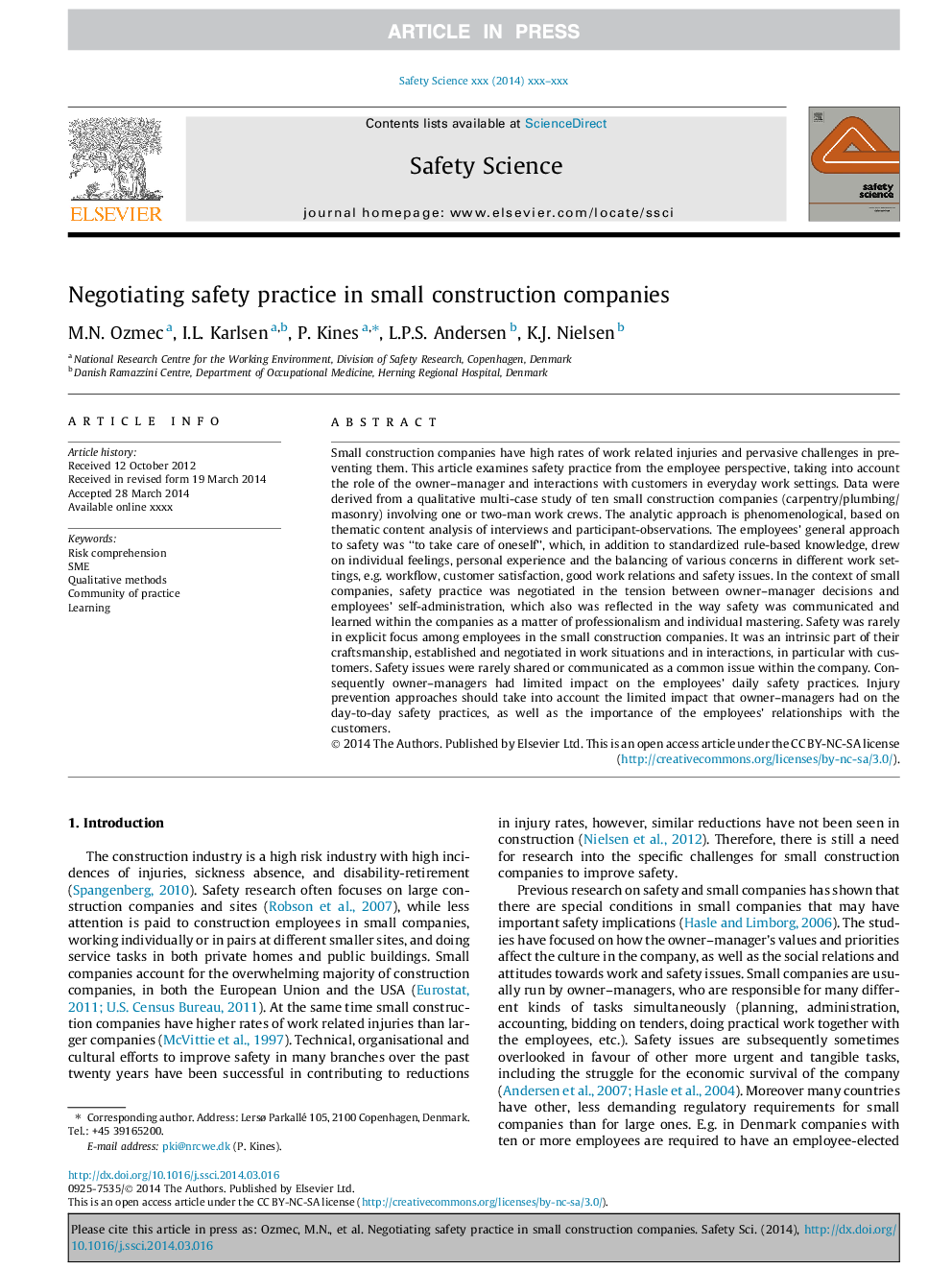| کد مقاله | کد نشریه | سال انتشار | مقاله انگلیسی | نسخه تمام متن |
|---|---|---|---|---|
| 10374333 | 878688 | 2015 | 7 صفحه PDF | دانلود رایگان |
عنوان انگلیسی مقاله ISI
Negotiating safety practice in small construction companies
ترجمه فارسی عنوان
مذاکره در مورد ایمنی در شرکت های کوچک ساختمانی
دانلود مقاله + سفارش ترجمه
دانلود مقاله ISI انگلیسی
رایگان برای ایرانیان
کلمات کلیدی
ترجمه چکیده
شرکت های کوچک ساختمانی دارای میزان بالایی از آسیب های مرتبط با کار و چالش های فراگیر در جلوگیری از آنها هستند. در این مقاله، بررسی عملکرد ایمنی از منظر کارکنان، با توجه به نقش مدیر مالک و تعامل با مشتریان در تنظیمات روزمره کار. داده ها با استفاده از یک مطالعه کیفی چند مورد از ده شرکت ساختمانی کوچک (نجاری / لوله کشی / سنگ تراشی) که شامل یک یا دو نفر کار خدمه کار بود. رویکرد تحلیلی پدیده شناسی است و بر مبنای تحلیل محتوایی مصاحبه ها و مشاهدات شرکت کنندگان است. رویکرد کلی کارکنان به ایمنی مراقبت از خودشان بود، که علاوه بر دانش استاندارد مبتنی بر قاعده، بر احساسات فردی، تجربه شخصی و متعادل کردن نگرانی های مختلف در تنظیمات مختلف کاری، به ویژه برای گردش کار، رضایت مشتری، روابط خوب کار و مسائل ایمنی. در زمینه شرکت های کوچک، تدابیر ایمنی در تنش بین تصمیم گیری های مالک و مدیر و خود اداری کارکنان مذاکره شد، که همچنین در نحوه ایمن سازی در شرکت ها به عنوان حرفه ای و تسلط فردی مورد استفاده قرار گرفت. ایمنی در میان کارکنان شرکت های کوچک ساختمانی به ندرت در تمرکز صریح قرار داشت. این بخش ذاتی از ساخت و ساز آنها بود، ایجاد و مذاکره در شرایط کاری و در تعاملات، به ویژه با مشتریان. مسائل ایمنی به ندرت به اشتراک گذاشته شد و یا به عنوان یک مسئله رایج درون شرکت ارتباط برقرار شد. در نتیجه مدیران صاحب تأثیر محدودی بر شیوه های ایمنی روزانه کارکنان داشتند. رویکردهای پیشگیری از آسیب دیدگی باید تاثیرات محدودی را که مدیران صاحب بر روی شیوه های ایمنی روزمره و همچنین اهمیت روابط کارکنان با مشتریان دارند، داشته باشد.
موضوعات مرتبط
مهندسی و علوم پایه
مهندسی شیمی
بهداشت و امنیت شیمی
چکیده انگلیسی
Small construction companies have high rates of work related injuries and pervasive challenges in preventing them. This article examines safety practice from the employee perspective, taking into account the role of the owner-manager and interactions with customers in everyday work settings. Data were derived from a qualitative multi-case study of ten small construction companies (carpentry/plumbing/masonry) involving one or two-man work crews. The analytic approach is phenomenological, based on thematic content analysis of interviews and participant-observations. The employees' general approach to safety was “to take care of oneself”, which, in addition to standardized rule-based knowledge, drew on individual feelings, personal experience and the balancing of various concerns in different work settings, e.g. workflow, customer satisfaction, good work relations and safety issues. In the context of small companies, safety practice was negotiated in the tension between owner-manager decisions and employees' self-administration, which also was reflected in the way safety was communicated and learned within the companies as a matter of professionalism and individual mastering. Safety was rarely in explicit focus among employees in the small construction companies. It was an intrinsic part of their craftsmanship, established and negotiated in work situations and in interactions, in particular with customers. Safety issues were rarely shared or communicated as a common issue within the company. Consequently owner-managers had limited impact on the employees' daily safety practices. Injury prevention approaches should take into account the limited impact that owner-managers had on the day-to-day safety practices, as well as the importance of the employees' relationships with the customers.
ناشر
Database: Elsevier - ScienceDirect (ساینس دایرکت)
Journal: Safety Science - Volume 71, Part C, January 2015, Pages 275-281
Journal: Safety Science - Volume 71, Part C, January 2015, Pages 275-281
نویسندگان
M.N. Ozmec, I.L. Karlsen, P. Kines, L.P.S. Andersen, K.J. Nielsen,
